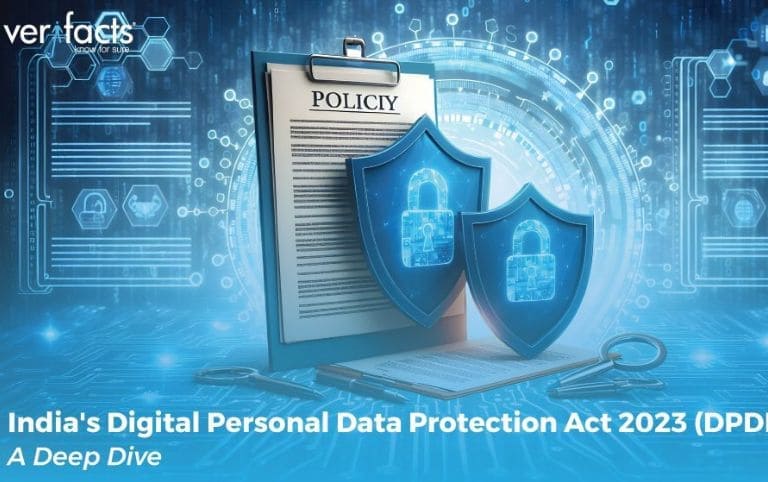
🌐 Introduction
The Digital Personal Data Protection Act, 2023 (DPDPA) marks a landmark step in India’s journey towards robust data privacy and security. In an era where personal information is the new currency, protecting the rights of individuals while enabling responsible data use is critical.
The Act establishes a comprehensive framework to regulate the processing, storage, and transfer of personal data. It defines the rights of individuals, outlines the obligations of organizations, and provides for strict enforcement through a central authority.
⚖️ Key Provisions of the DPDPA
1️⃣ Clear Definitions
The Act lays down precise definitions to eliminate ambiguity:
-
📌 Personal Data → Any data related to an identifiable individual.
-
📌 Sensitive Personal Data → Includes financial, biometric, health, and official identifiers.
-
📌 Data Fiduciary → The entity deciding how and why data is processed.
-
📌 Data Processor → An entity processing data on behalf of a fiduciary.
These definitions establish the scope and applicability of the Act.
2️⃣ Responsibilities of Data Fiduciaries 🏢
Entities handling personal data have strict obligations, such as:
-
✅ Ensuring lawful, fair, and transparent processing.
-
🔐 Implementing robust security safeguards against breaches.
-
👤 Allowing individuals to access, update, or erase their data.
-
📢 Reporting data breaches promptly to authorities and impacted individuals.
-
📝 Maintaining records of processing activities for accountability.
3️⃣ Rights of Individuals 👥
The DPDPA strengthens individual autonomy over personal data:
-
🔎 Right to Access → Know what personal data is being processed.
-
✏️ Right to Rectification → Correct inaccurate or outdated data.
-
🗑️ Right to Erasure → Request deletion of personal data when no longer necessary.
-
⛔ Right to Object → Refuse processing in certain circumstances.
-
🔄 Right to Data Portability → Transfer data between service providers easily.
These rights empower citizens to be active participants in their digital identity management.
4️⃣ Rules for Data Transfers 🌍
-
📤 Personal data may be transferred outside India only with adequate safeguards in place.
-
🤝 Cross-border data flows must comply with government-approved conditions to ensure privacy.
-
🛡️ Fiduciaries must guarantee that foreign processors follow equivalent protection standards.
This ensures a balance between global business operations and local privacy protections.
5️⃣ Data Breach Management 🚨
-
⏱️ Timely Notification → Fiduciaries must inform both the Data Protection Authority (DPA) and affected individuals quickly.
-
🛠️ Mitigation Steps → Organizations must act immediately to minimize damage.
-
📣 Transparency → Proper communication builds trust and accountability in crisis management.
6️⃣ Enforcement Through Data Protection Authority (DPA) 🏛️
The Act establishes an independent Data Protection Authority, with powers to:
-
🔍 Investigate complaints and breaches.
-
⚖️ Impose penalties for violations.
-
📜 Issue guidelines and binding directives.
-
🛡️ Ensure businesses maintain compliance with the Act.
This authority acts as the guardian of data protection in India.
📊 Impact of the DPDPA
The Act is set to transform India’s digital ecosystem:
-
💻 Technology & IT → Stronger security practices for data-driven businesses.
-
🛒 E-commerce → Enhanced consumer confidence in online transactions.
-
🏥 Healthcare → Protection of sensitive health records.
-
💳 Finance & Banking → Reduced risks of identity theft and financial fraud.
-
🌟 Consumer Trust → Citizens more willing to share data with organizations they trust.
⚠️ Challenges & Concerns
While progressive, the DPDPA also raises challenges:
-
🏗️ Effective Enforcement → Ensuring DPA has adequate resources and independence.
-
🏢 Business Compliance Burden → SMEs may face cost and operational hurdles.
-
🌍 Global Data Flows → Balancing local laws with international trade requirements.
-
🔄 Evolving Technology → Adapting provisions for AI, big data, and emerging innovations.
📝 Conclusion
The Digital Personal Data Protection Act, 2023 is a historic milestone in India’s data privacy framework. By providing clear principles, rights, and enforcement mechanisms, it seeks to create a safe, transparent, and trustworthy digital environment.
While organizations must invest effort in compliance and cultural change, the long-term benefits include:
-
Stronger consumer confidence 🤝
-
Improved global competitiveness 🌍
-
A resilient digital economy 💡
🔑 Takeaway: The DPDPA is not just a compliance requirement—it is a strategic opportunity for businesses to build trust and leadership in the digital age.

